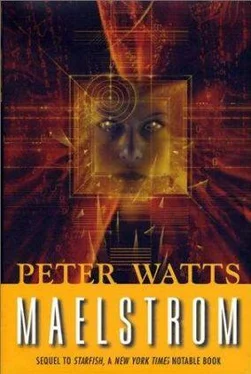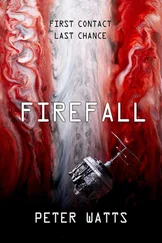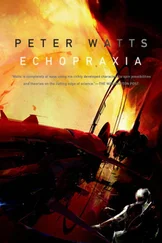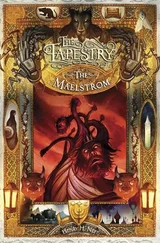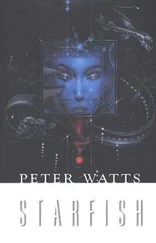" Shit ," Kinsman said. Lubin's headset amped the whisper loud enough to drown thunder.
She kept her billy. All the way from Beebe, hitching and walking and riding across the whole damn continent.
Good for her…
The vision imploded to darkness and a final flurry of static. Lubin was back on the waterfront, sheets of rain beating the world into a blur scarcely brighter than the one he'd just left.
"Gandhi's down," Kinsman reported.
* * *
Kinsman tag-teamed two more dolphins to the site of Gandhi's last stand; Lubin pulled abreast on the seawall a few moments after they arrived. Burton was waiting there with a charged squid, water cascading from his rainskin.
"Fan them out," Lubin told Kinsman over the link. "Hyperbolic focus on the carcass, offshore spread." He grabbed his fins off the scooter and stepped to the edge of the seawall, Burton at his side. "What about Gandhi?"
"Gandhi's sockeye," Kinsman said.
"No, I mean what about emotional ties? What impact will his loss have on the efficiency of the others?"
"For Singer and Caldicott, none. They never liked him all that much. That's why I sent them."
"Okay. Line up the rest on a converging perimeter, but keep them away from the outfalls."
"No problem," Kinsman acknowledged. "They wouldn't be much good in there anyway, with those acoustics."
"I'm switching to vocoder in thirty seconds. Channel five."
"Got it."
Burton watched neutrally as Lubin bent over to pull on his fins. "Bad break!" he shouted over the storm. "About the sewers, I mean!"
Lubin snugged his heel straps, reached out for the squid. Burton handed it over. Lubin sealed his face flap. The diveskin reached across his eyelids and bonded to the caps beneath, blocked nose and mouth like liquid rubber. He stood, isolated from the downpour, calmly suffocating.
Good luck , Burton mouthed through the rain.
Lubin hugged the squid to his chest and stepped into space.
* * *
Michigan closed over his head, roaring.
Fifteen meters to the north, one of Chicago's outfalls spewed an endless vomit of wastewater into the lake; the whirlpools and eddies from that discharge reached Lubin with scarcely-diminished strength. A fog of microscopic bubbles swirled on all sides, smeared muddy light throughout the water. Bits of detritus looped through eccentric orbits, fading to white just past the reach of his fingers. Water sucked and slurped on all sides. Overhead, barely visible, the rain-pelted surface writhed like mercury under rapid-fire assault—and all around, omnipresent in the heavy surge, the deep deafening roar of waterfalls.
Lubin spun in the current, insides flooding, and reveled.
He didn't think that Lenie Clarke was headed for deep water just yet. She might not have anticipated the minisubs lurking deep offshore; she knew about the dolphins, though, and she knew about sonar. She knew all about the effects of turbulence on sensory systems both electronic and biological. She'd stay close to shore, hiding in the cacophony of the outfalls. Soon, perhaps, she'd edge north or south in furtive stages, creeping along a murky jungle of wreckage and detritus left over from three centuries of out-of-sight-out-of-mind . Even in calm weather there'd be no shortage of hiding places.
Now, though, she was injured, probably fighting shock. Gandhi had hit her twice before Clarke had rallied; it was amazing that she'd even stayed conscious through that pounding, let alone fought back. For the time being she was holed up somewhere, just hanging on.
Lubin glanced at the nav console on his wrist. A tiny two-d representation of local space sparkled there—starring, as Ken Lubin, a convergence of sharp green lines at center stage. Occasional yellow pinpoints drifted in and out of range: Kinsman's dolphins, patrolling the perimeter. Another pinpoint, much closer, wasn't moving at all. Lubin aimed his squid and squeezed the throttle.
Gandhi was a mess. Clarke's billy had discharged against the right side of his head; the front of the animal had been blown apart in an instant. Behind the dorsal fin, the carcass was pretty much intact. Farther forward a fleshy wreckage of ribs and skull remained on the left side, that maniacal idiot dolphin grin persisting even past death. The right side was gone entirely.
Gandhi was impaled on a sunken tangle of rebar. The current here moved offshore; the dolphin must have met his fate closer to the seawall. Lubin swung the squid around and started upstream.
"…eive…Lu…ical?"
The word fragments buzzed along his lower jaw, all but lost in the ambient thunder. Lubin, struck by sudden realization, cranked up the gain on his vocoder: "Keep this channel clear. Cl—"
His words, transmuted by the vocoder into a harsh metallic buzz, caught him offguard. It had been months since the implants had mutilated his voice that way. The sound almost invoked a kind of nostalgia.
"No contact," he continued. "Clarke's got L-FAM implants. She could be listening in."
"…ain?…"
In fact, even if Clarke was tuned to the right channel, it was doubtful that she'd make any more sense of the signal than Lubin had. Acoustic modems had not been built with whitewater in mind.
And why would she be listening anyway? How would she know I'm even here?
It wasn't a chance he was willing to take. He kept as silent as his quarry, wherever she was. The lake raged around them both.
Intuition is not clairvoyance. It's not guesswork either. Intuition is executive summary , that ninety percent of the higher brain that functions subconsciously—but no less rigorously—than the self-aware subroutine that thinks of itself as the person. Lubin glided through murk so thick he could barely see the squid that drew him forward; he set the machine to heel and crawled through dead twisted warrens of wreckage and dereliction, spikes and jagged edges rampant under layers of slime that softened only their appearance. He let the current push him offshore, then grab him and hurl him against the base of the seawall itself. He clambered sideways like a crab on gray scoured surfaces, pressed himself flat while the water tried to peel him off and flick him away like an old decal. He let those intuitive subroutines guide him; weighing scenarios, sifting memories, remembering happier times when Lenie Clarke had revealed this motive, that preference. He explored some potential refugia, ignored others, and would not have been able to say exactly why. But all parts of Ken Lubin had been well and thoroughly trained: the brain stem and the analytical subroutines and the little homunculus that sat self-consciously behind his eyes. Each knew what to do, and what to leave to the others.
And so it was not entirely unexpected that he should come upon Lenie Clarke, hiding in the shadow of one of Chicago's absurd waterfalls, wedged in a canyon of wreckage from the previous century.
She was in bad shape. Her body was twisted in a way that suggested Gandhi's blows had done their job. Her diveskin had been torn along the ribcage, either from the dolphin's attack or from the jagged geometry of the lakebed. She favored her left arm. But she'd chosen her refuge well; too much noise for sonar, too much metal for EM signatures, too much shit in the water for anyone without the eyes and the instincts of a rifter to ever track her down. Burton would have passed within a meter and not picked up the scent.
Good girl , he thought.
She looked up from her hiding place, her featureless white eyes meeting his through two meters of milky chaos, and he knew instantly that she recognized him.
He had hoped, against all reason, that she wouldn't.
Читать дальше
